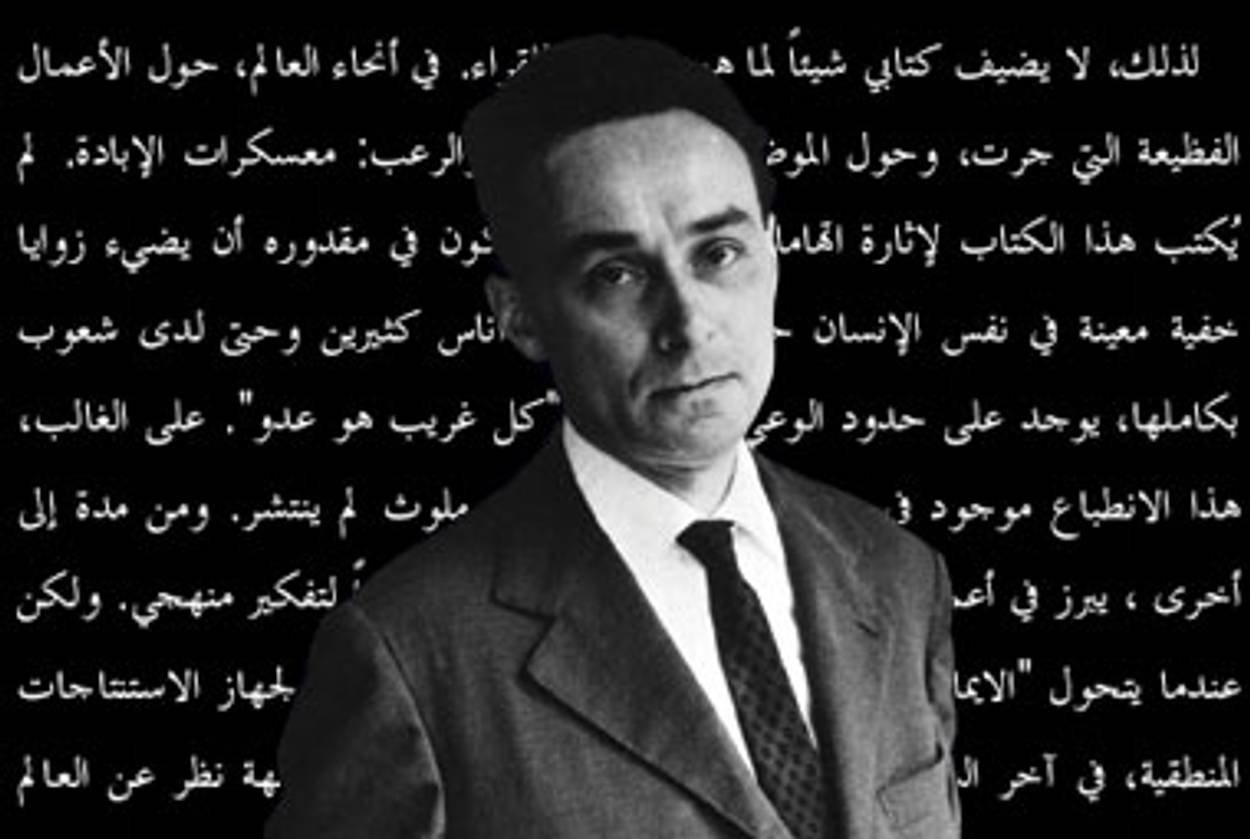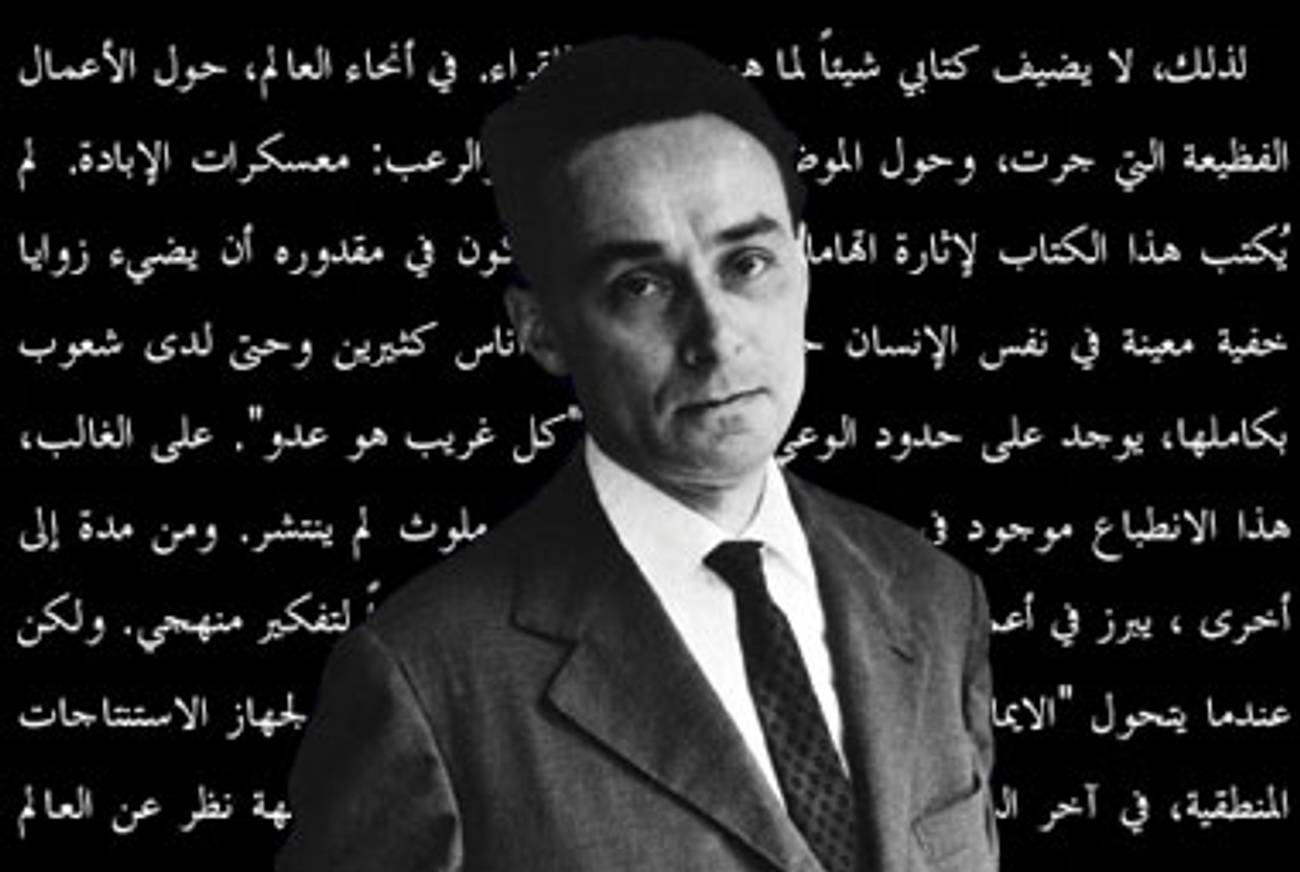Reading Levi in Tehran
A new project offers Arabic and Farsi translations of key Holocaust works




Like the majority of those who grow up in Muslim countries, Boualem Sansal didn’t think about the Holocaust much. It just wasn’t an issue in his native Algeria, and when it came up, it was presented more as a subject for debate than as a monumental historical event. “We’ve been brought up not to really believe it happened,” he said in a recent interview.
All this changed when he met the German. He doesn’t remember the man’s name, but still recalls the shock he felt when he learned his tall, genial neighbor was an escaped SS officer, wanted for crimes against humanity and living out his years working as a security consultant for various Arab governments. Sansal wanted to know more, to learn about the ghettos and the trains and the death camps, things he was increasingly convinced were not rumors at all. But in Algeria, there was no one he could ask.
As luck would have it, Sansal had an older brother studying in Paris, who, after some pleading, agreed to send over some books. Sansal read them all eagerly, but only one changed his life: Primo Levi’s If This Is a Man, the book commonly known in the United States as Survival in Auschwitz. He declared himself a disciple of Levi’s, and devoted much of his life to thinking and writing about the same questions that troubled his mentor, most notably the question of memory.
Now, Arab and Muslim readers wishing to follow Sansal’s lead no longer have to depend on contraband copies in foreign languages: thanks to a new initiative called Project Aladdin, Levi’s memoir, along with Anne Frank’s diary and two other Holocaust-themed works, are available in Arabic as a free download, alongside editions in Turkish and Farsi.
The project, according to its founder, Abraham Radkin, was conceived in response to a steep rise in the volume of anti-Semitic and Holocaust-denying literature distributed in the Arab and Muslim world—and the rhetoric of Iran’s president, Mahmoud Ahmadinejad. With hundreds of hateful tracts published each year, Radkin thought, the most effective response would be to provide reliable, informative, and evocative alternatives. The executive director of the British nonprofit Human Rights Foundation, Radkin had the necessary connections to attract high-level patrons to his project, putting together an advisory board that includes the president of Senegal, Abdoulaye Wade; Princess Haya al-Khalifa of Bahrain; Prince Hassan bin-Talal of Jordan; former French president Jacques Chirac; and former German chancellor Gerhard Schroeder. With some help from the United Nations and other international organization, the project was ready to launch.
Its first hurdle was deciding which books to publish. “We were looking,” Radkin said in a recent interview, “to publish four books that gave a general public basically unaware of the historical facts an idea of the scale of the horror, that gave personal testimony, and that provided accurate descriptions of what happened to people.”
Anne Frank was a natural choice, as was Shlomo Venezia’s Inside the Gas Chambers: Eight Months in the Sonderkommando of Auschwitz, a survivor’s account of the camp’s intricate machinery of death. Phillipe Burrin’s Hitler and the Jews: The Path to Genocide was added as a general, approachable primer on the basic historical facts of the Holocaust. This left room for one additional title; after much argument—some board members thought the book would prove too dense for a population with little education about the Holocaust—Radkin decided to publish Levi as well, the first time the author had been translated into Arabic or Farsi. In March 2009, all four titles were offered for free online.
While the project is still in its infancy, a few thousand copies of each book have already been downloaded, and the project’s staff received hundreds of encouraging emails from readers throughout the Arab world. Local publishers in Morocco, Turkey, Egypt, Tunisia, Lebanon, and France will soon offer the translations in paperback, and publishers in other countries are slated to join in the coming months. Other initiatives, from student exchange programs to outreach efforts, are also in the works.
“I think the project has the potential to bring about real change on the ground,” Radkin said. “I have great faith in the importance of education and cultural interaction with people who are kept in the dark by those forces who benefit from ignorance.”
Those very forces, Sansal agreed, are not to be underestimated. “The situation in the Arab world is absolutely catastrophic,” he said, calling the abuse of women in particular “another Shoah.” It’s a theme that Sansal pushes to its extremes: his recent book, The German Mujahid, tells the story of two Algerian brothers who discover that their German father was a fugitive war criminal, and makes bold parallels between Nazism and fundamentalist Islam.
Speaking in a recent conference on Primo Levi, where he was seated next to Radkin and other intellectuals, Sansal expressed his pleasure with the new translations. Just like Levi had once delivered Sansal from ignorance, the Algerian writer said he hoped and believed If This Is a Man would now open the eyes of a new generation of Arab and Farsi readers. “Levi provides a clear vision,” he said. “It’s a vision of remembrance and responsibility.”
Levi’s is also a vision likely to appeal to Muslim audiences, said Natalia Indrimi, the director of the New York-based Primo Levi Center, which organized the recent conference, because of its ability to portray the Holocaust in terms that are universally understandable.
“Levi speaks and writes as a man,” she said. “I trust very much that he’ll speak to people as people. If This Is a Man does not make suffering or the mechanism of genocide a Jewish property. It desegregates the Shoah. It teaches us how to come close to the other without putting labels on ourselves or on the other.”
Liel Leibovitz is a senior writer for Tablet Magazine and a host of the Unorthodox podcast.
Liel Leibovitz is editor-at-large for Tablet Magazine and a host of its weekly culture podcast Unorthodox and daily Talmud podcast Take One. He is the editor of Zionism: The Tablet Guide.